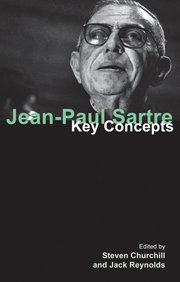Book contents
- Frontmatter
- Contents
- Contributors
- Acknowledgements
- Note on abbreviations
- 1 Introduction: Sartre vivant
- 2 Life and works
- Part I PSYCHOLOGY, PSYCHOANALYSIS AND LITERATURE
- Part II ONTOLOGY: FREEDOM, AUTHENTICITY AND SELF-CREATION
- Part III ETHICS AND POLITICS
- 15 Politics and the engaged intellectual
- 16 Sartre's theory of groups
- 17 Sartre's second or dialectical ethics
- 18 Hope and affirmation: an ethics of reciprocity
- 19 Sartre's legacy
- Bibliography
- Index
17 - Sartre's second or dialectical ethics
from Part III - ETHICS AND POLITICS
- Frontmatter
- Contents
- Contributors
- Acknowledgements
- Note on abbreviations
- 1 Introduction: Sartre vivant
- 2 Life and works
- Part I PSYCHOLOGY, PSYCHOANALYSIS AND LITERATURE
- Part II ONTOLOGY: FREEDOM, AUTHENTICITY AND SELF-CREATION
- Part III ETHICS AND POLITICS
- 15 Politics and the engaged intellectual
- 16 Sartre's theory of groups
- 17 Sartre's second or dialectical ethics
- 18 Hope and affirmation: an ethics of reciprocity
- 19 Sartre's legacy
- Bibliography
- Index
Summary
When Jean-Paul Sartre died in 1980, some in the French press called him the moral conscience of post-war France. In fact, in an interview he gave towards the end of his life, Sartre himself stated that he had always been a “moral philosopher” and also that he had attempted to write three different ethics in his lifetime. Of course, ethics was just one of his many interests. His exceptional talent led him to write plays, novels and short stories, works on psychology and political theory, ontology, philosophy of history, philosophy of art and philosophical biographies. Nevertheless, I believe that his interests in moral philosophy and moral values were at the centre of his life and constituted the underlying substructure (to use a Marxian term) of his life and works. One reason I say this is because almost from the beginning his ethics was humanistic in that he identified the goal of morality and the goal of human existence.
This chapter is primarily devoted to what Sartre himself designated as his second “realistic” ethics, thereby contrasting it with his first “idealistic” ethics. The latter was the one he promised at the end of Being and Nothingness and worked on for well over a decade. He eventually came to believe that this ethics, based on the ontological categories set forth in that early phenomenological ontology, was too far removed from the real world in which human beings existed.
- Type
- Chapter
- Information
- Jean-Paul SartreKey Concepts, pp. 195 - 205Publisher: Acumen PublishingPrint publication year: 2013

